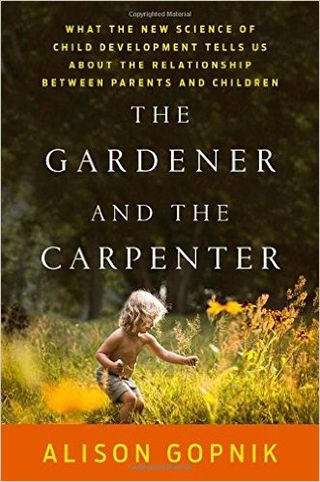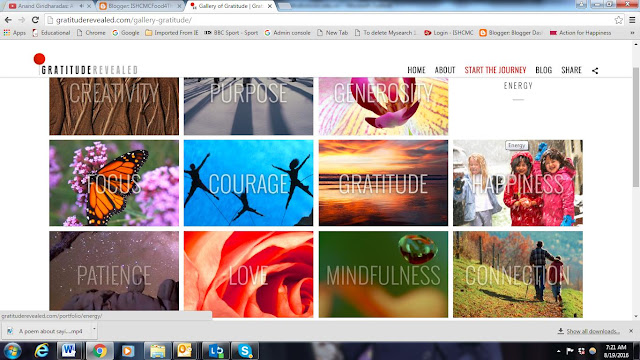Dear all,
There is so much that I want to share with you but don't want to overburden you, hence I decided to complete the post on a Friday so as to give you time to browse over the weekend. This week's Food for Thought has several parts and an additional provocation, that in their way build on the work we started in our Tuesday meeting. Our goal last Tuesday was to help you take time to explore which of the positive emotions are strong for you and which need building up. We believe that this exercise will benefit all of us in the long run.
The first two parts of this weeks Food for Thought relate very much to our year long inquiry, Who are we? The first is a series of thoughts from the philosopher Alan Watts, not a relative, who encourages us all to reflect upon how we are living our lives and subtly asks, are making the most of your time?
The second part is a meditation that deepens our understanding of who you are and can be undertaken with your partner or close friend. It is designed to help you gradually move away from self obsession towards being able accept and appreciate others. It is believed that until you are able to understand your own selfishness you will not be able to cultivate kindness.
"The only way to maintain that connection is to extend our awareness to include all of our experience, not just the parts that we find comfortable. Meditation practice is a good way to begin because it is a process of becoming aware of whatever comes up in our mind, both good and bad, painful and pleasurable. We are learning to be open to who we are, and whatever we are experiencing. So meditation practice is not just a mental exercise; it is a way of making friends with ourselves at a very basic level. Step by step we are learning more about ourselves and accepting and integrating those parts of ourselves we had rejected.
This exercise takes two people. To begin, sit quietly together, either next to one another or facing one another. Take some time to settle your mind, placing your attention lightly on the breath. Do not rush, but allow enough time to settle and to be at ease simply sitting together in proximity.
The next step is to consciously include your partner in your practice. As you breathe out, extend your attention out to her and as you breathe in consciously include her in your awareness. Be as straightforward here as possible. You are not analyzing your partner’s state of mind or trying to figure her out, but simply being aware of her presence.
Finally, pay attention to the space between you and your partner and your connection to one another. Into that mutual space, as you breathe out, project a quality of acceptance and simple friendship to your partner. On the in-breath, take in and receive the acceptance and friendship that your partner is extending to you. Feel the energy of acceptance and friendship circulate between the two of you.
To conclude, spend a few minutes simply sitting together quietly.
When we sit quietly like this with another person, we gradually become more aware of that person’s presence. We begin to accept and appreciate her or him. Those two qualities, awareness and acceptance, are the ground of kindness. But we keep getting absorbed with ourselves, and losing our awareness of others. When we are caught up in our own concerns, our appreciation and awareness vanish. They completely disappear—poof!
We might prefer to ignore our tendency to focus on our own concerns and ignore the concerns of others. However, if we want to cultivate kindness, we first need to understand our own selfishness. That is where we begin. We need to stop and take a good look at this fixation with ourselves."
http://www.lionsroar.com/kindness-to-ourselves-and-others/?utm_source=Lion%27s+Roar+Newsletter&utm_campaign=c2826ddd7f-LR_Weekend_Read_August_19_20168_10_2016&utm_medium=email&utm_term=0_1988ee44b2-c2826ddd7f-21844437&goal=0_1988ee44b2-c2826ddd7f-21844437&mc_cid=c2826ddd7f&mc_eid=fc6b2aaa9c
Finally, here is one extra piece of research that further supports what we feel is right in the way we are approaching student learning at ISHCMC. If you don't want to read the book the rest of this post from Psychology Today, will certainly give you research based reasoning if a parent ever questions your pedagogy. Here is a brief extract from the post.

"Alison Gopnik is a renowned developmental psychologist whose research has revealed much about the amazing learning and reasoning capacities of young children, and she may be the leading interpreter of such research to the general public. She is one of the best science writers I know of. In her most recent book, The Gardener and the Carpenter, released just a few days ago, she describes the results of many clever experiments that help us understand how young children learn by watching others, listening to others, and manipulating objects in systematic ways in their play.
A persistent theme emerging from such research, as Gopnik explains, is that children learn not by passively absorbing information, but by actively engaging their social and physical environments and drawing logical inferences based on what they see, hear, and in other ways experience. Gopnik contends that children learn a great deal from other people, including from their parents, not because the others are deliberately teaching them but because those others are doing and talking about interesting things, which children are innately motivated to try to understand and incorporate into their own growing world views."
Have a great weekend,
Yours
Here is an additional provocation to think about as we think about who we are. We do not exist in isolation but in a fast changing world that is not the same for all, and impacts each one of us differently. This TED by writer Anand Giridharadas is a letter from one citizen to another. It's from one who has won in this era of change, to others who have, or feel, lost.It asks us to think deeply about the world that we are creating for ourselves and future generations and to find ways to understand each other before there is anger and blood. It outlines many of the challenges that our students will face in this changed world. In our search for who we are, I believe we cannot ignore the world beyond HCMC, and that we need to reflect upon where we stand, and from there be able to create a school that is built around a collective vision for the future.



